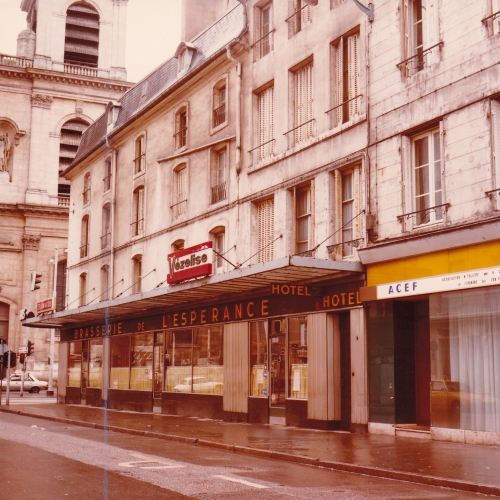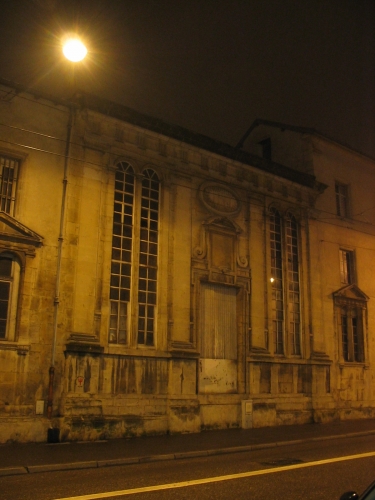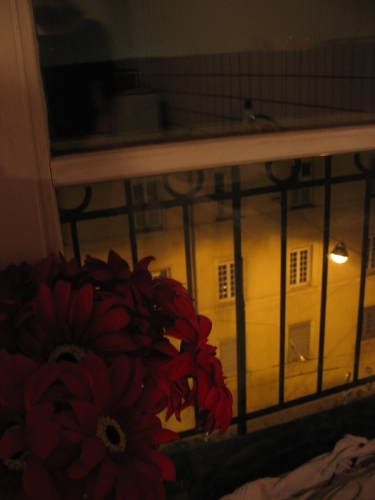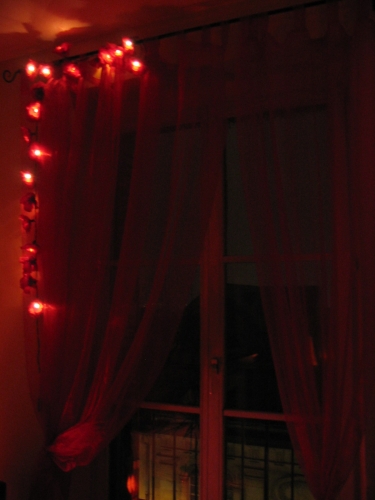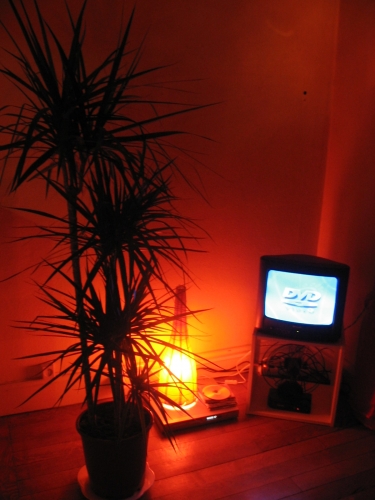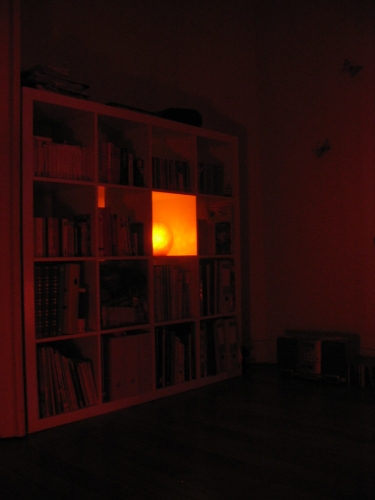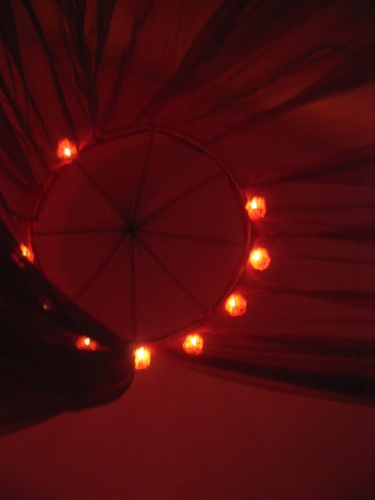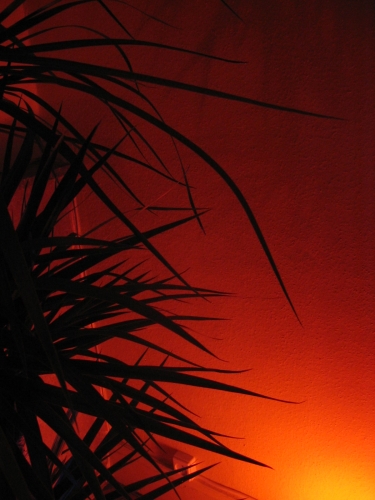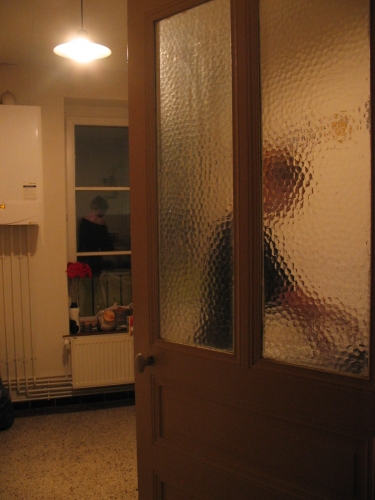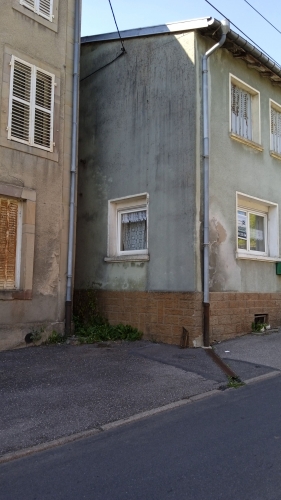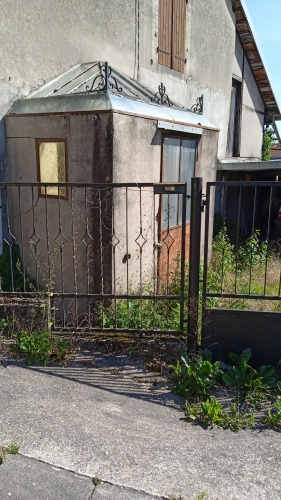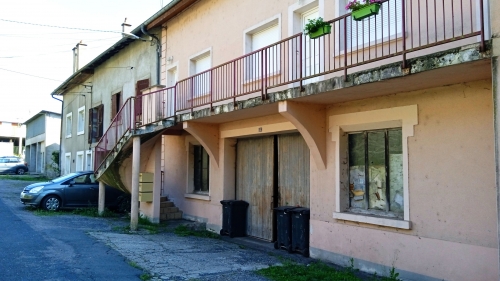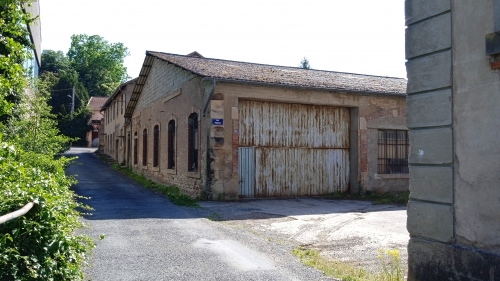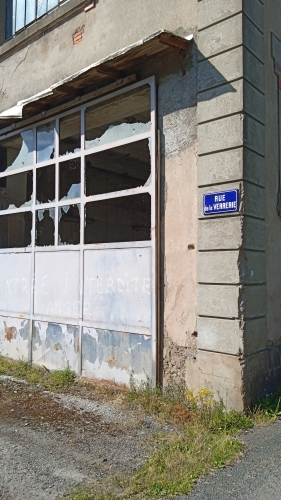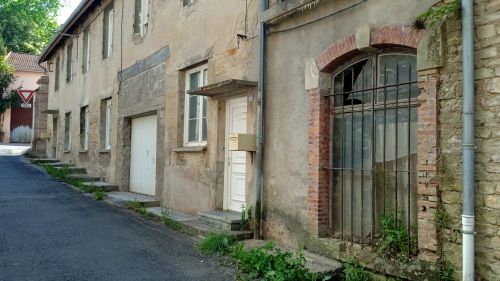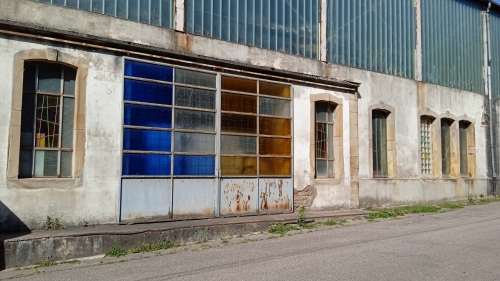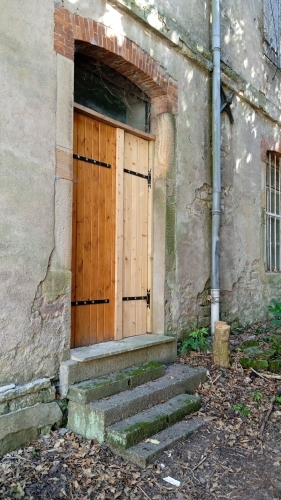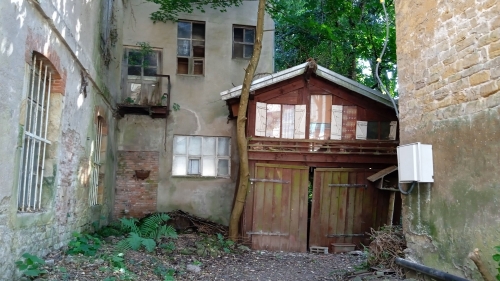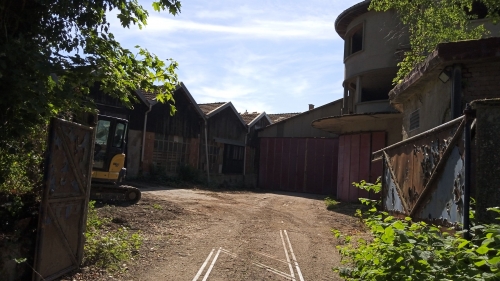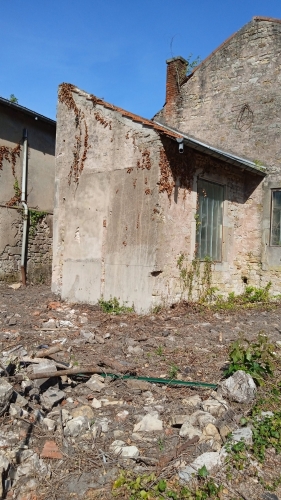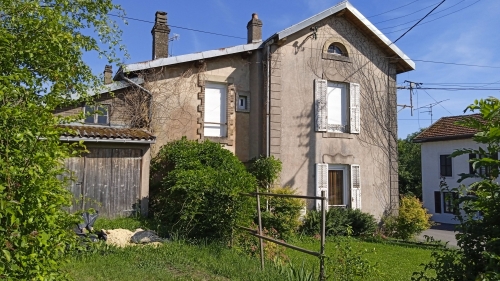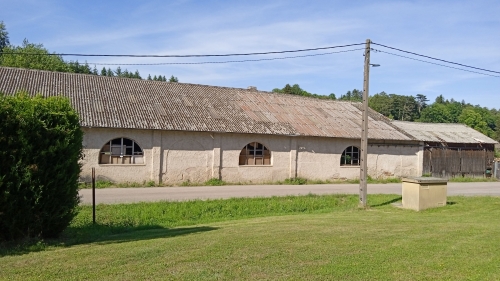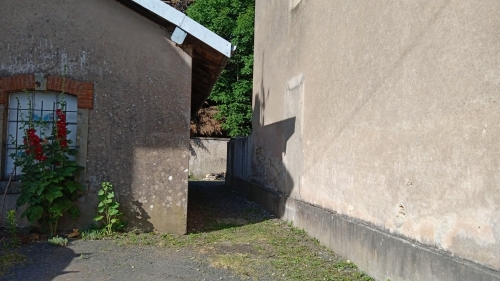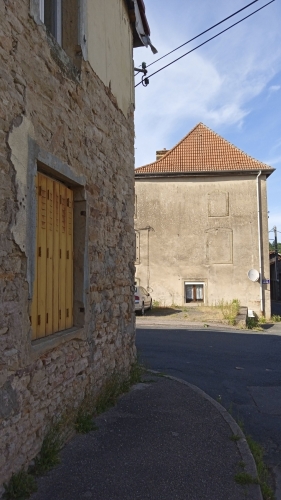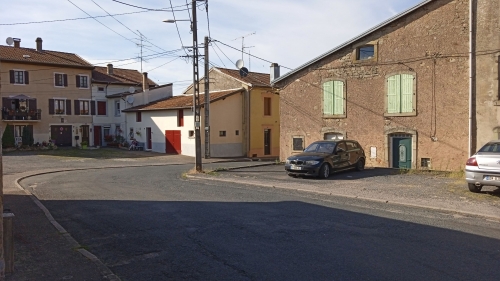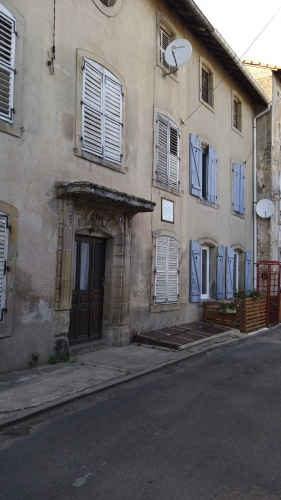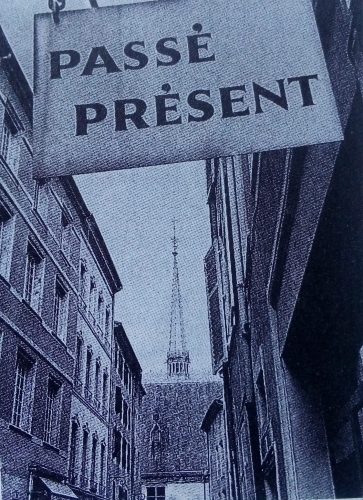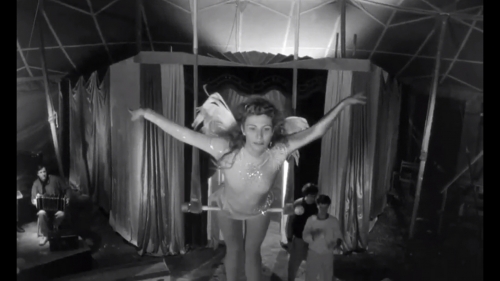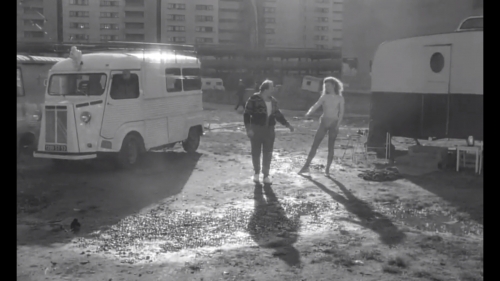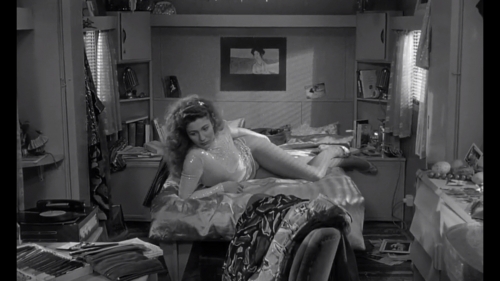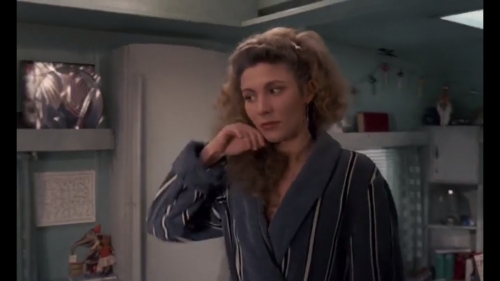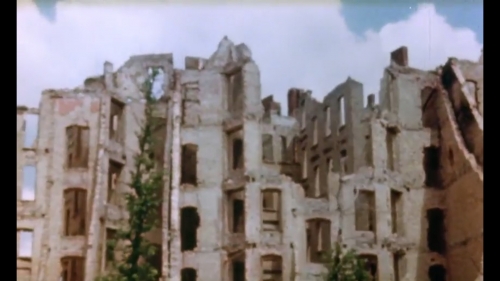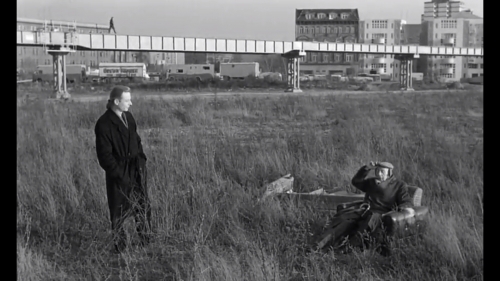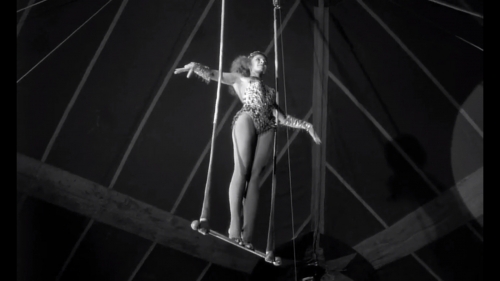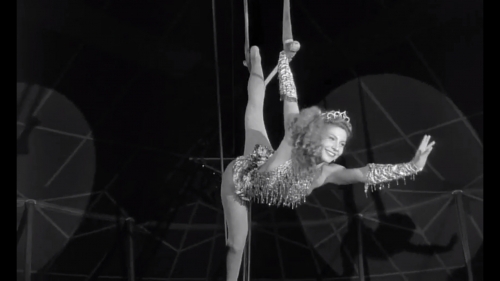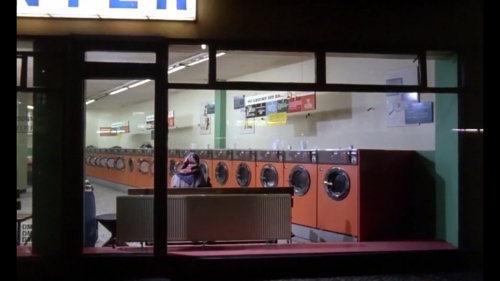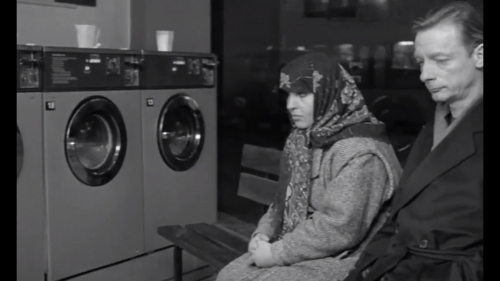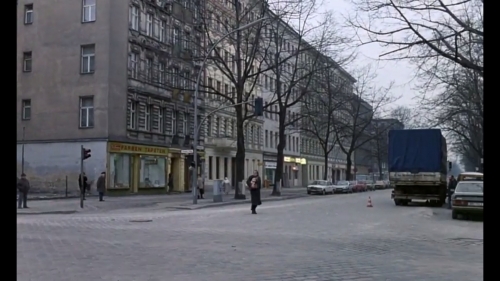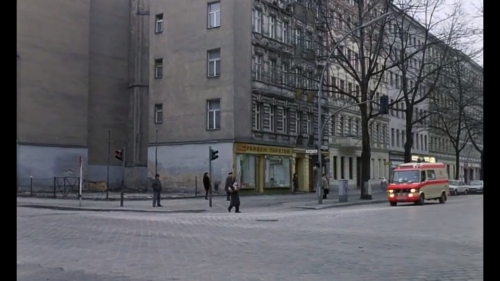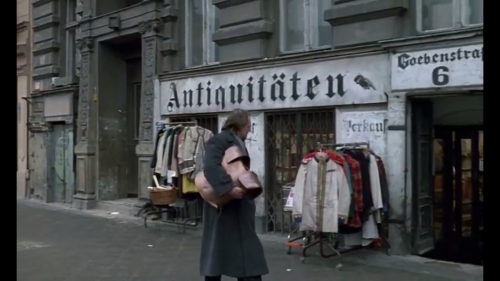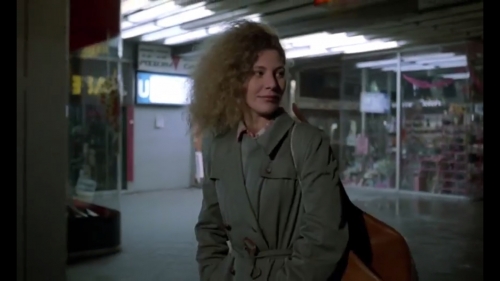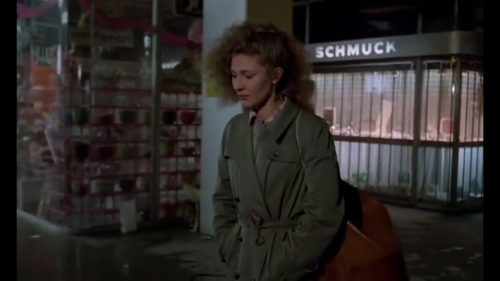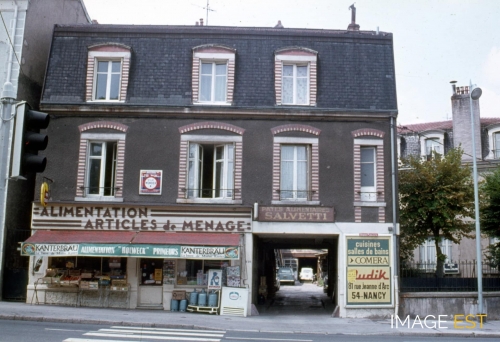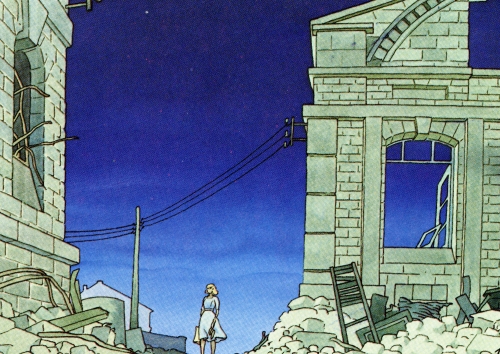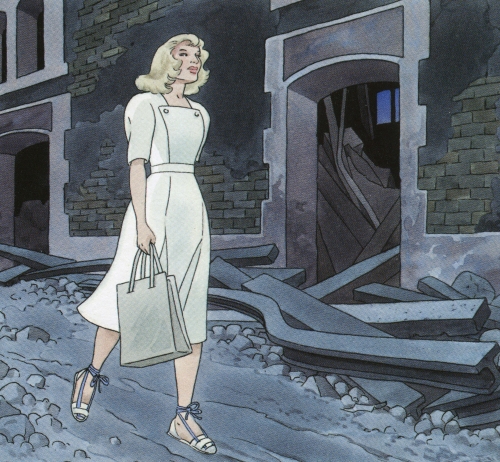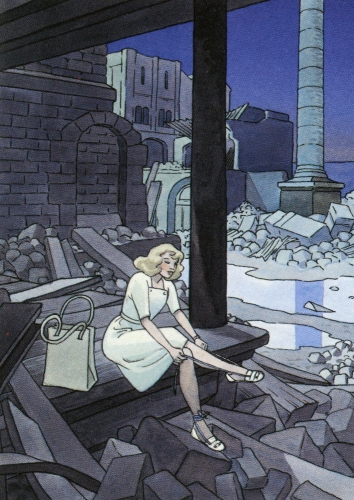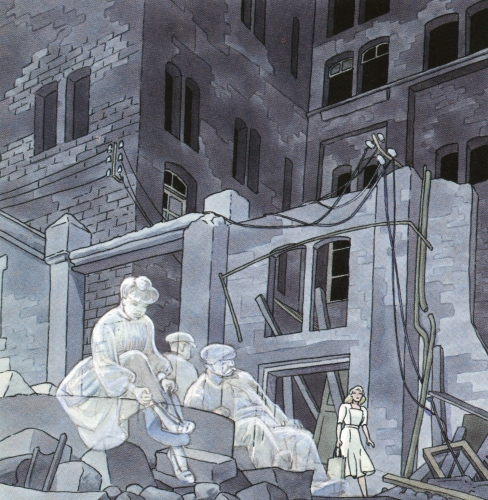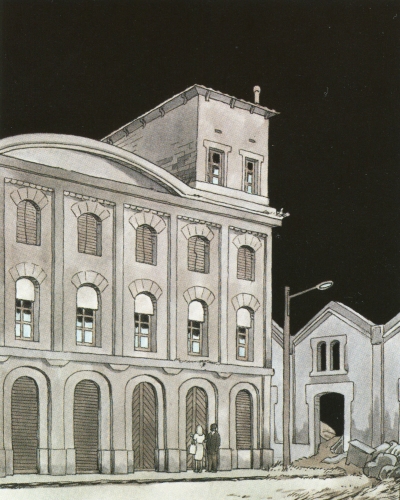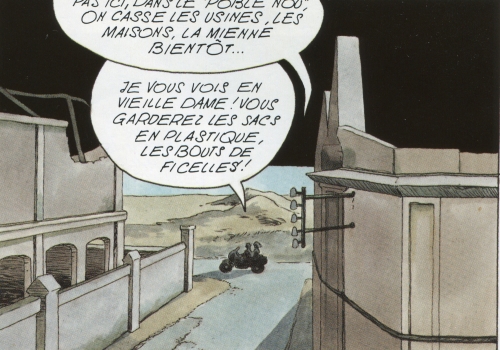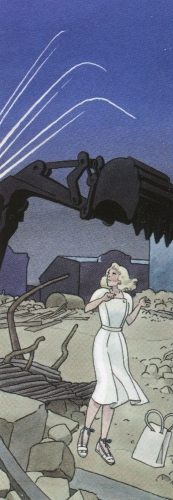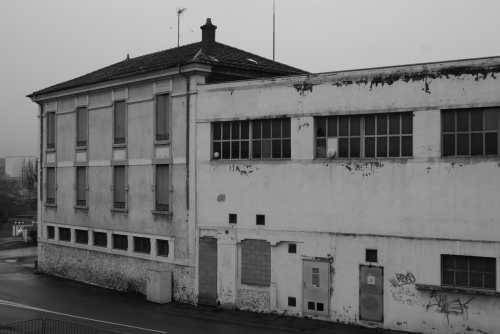Dans les villes grises / In the grey cities - Page 5
-
Brasserie de l'Espérance
-
Lupanar / Brothel (2005)
FRANÇAIS
Elle vivait près de la place des Vosges et de ses bizarreries architecturales, entre la collection de ruines antiques et le style Haussmannien. Son immeuble faisait face à un hôtel particulier qui me fascinait avec ses fenêtres étroites, hautes de plusieurs étages. Elle nous recevait dans son salon plongé dans une pénombre étrange, intime et chaude, seulement éclairée par une guirlande d'ampoules rouges qui nous faisaient nous deviner plus que nous voir, et donnait au tout une atmosphère de lupanar. L'ameublement était minimal ; un canapé, de grandes plantes en pot, une fourrure au sol. Mon logement, avec Aude, à l'époque, était impersonnel et froid. J’enviais ce cocon douillet et vaguement érotique. Elle y promenait ses longs cheveux bouclés, et les innombrables bijoux, qui de banale étudiante la transformaient en quelque chose de naïf et sophistiqué, entre la sorcière et la fille publique. Je n'étais-pas le seul à être sensible à l'ambiance ; avant de repartir, un soir, alors que notre hôte s'était absentée quelques instants du salon, Aude m'avait à voix basse, après un silence, demandé à faire l'amour en rentrant.
ENGLISH
She lived near the Place des Vosges and its architectural oddities, somewhere between a collection of ancient ruins and the Haussmann style. Her building faced a mansion that fascinated me with its narrow, multi-storey-high windows. She received us in her living room, immersed in a strange, warm, intimate half-light, lit only by a string of red bulbs that made us guess each other more than see each other, and gave the whole place a brothel-like atmosphere. The furnishings were minimal: a sofa, large potted plants and a furry floor. My home with Aude at the time was impersonal and cold. I envied this cozy, vaguely erotic cocoon. Her long curly hair and countless jewels transformed her from an ordinary student into something naïve and sophisticated, somewhere between a witch and a public girl. I wasn't the only one who was sensitive to the atmosphere; before leaving, one evening, when our host had left the salon for a few moments, Aude had asked me in a low voice, after a silence, to make love on the way home.
-
Vivoter dans les ruines / Living in the ruins
FRANÇAIS
Cet après-midi j'ai été chassé de chez moi par le boucan à l'étage au-dessus. Une fois de plus. Je suis donc parti me promener en voiture, dans une colère noire et ai échoué à Cirey.
J'y ai erré tout l'après-midi dans un état de sidération et d'excitation grandissante, en réalisant que toute la ville n'était à peu de chose près qu'une immense friche industrielle, aménagée et habitée. Avec ces rues entières de bâtiments visiblement inoccupés, inhabités, menaçant ruine. La grisaille, les pierres nues, les jardins à l'abandon. La végétation qui prolifère et donne une atmosphère paisible au désastre. Seules quelques rues pavillonnaires, semblables à celles de toutes les autres communes de France, semblaient récentes et en bonne santé, croissant dans toutes les directions aux confins de la ville, comme évitant son centre de ruines maudites.
Jamais je n'ai eu autant cette impression de voir un environnement d'après la fin du monde – et à l'échelle locale c'est réellement le cas ; la petite ville a connu une heure de gloire industrielle dont il ne reste rien aujourd'hui, et ses habitants vivent au milieu des ruines, au sens propre.
J'ai vu une femme ouvrir la porte d'un entrepôt abandonné qui lui servait apparemment de garage, peut-être même de pièce à vivre, qui sait, dans une usine abandonnée jouxtant sa maison.
J'ai vu une cabane en bois construite sur un ancien terrain industriel en friche. Des habitants y avaient aménagé des jardins.
J'ai erré sur des terrains au sol entièrement constitué de gravats, parsemé de maisons en ruines et d'entrepôts qui semblaient avoir été bombardés.
Un passé plus lointain se laissait deviner aussi ; en passant dans une ruelle désolée où je ne pensais rien trouver, j'ai vu le linteau extrêmement ouvragé de ce qui semblait une maison très ancienne et luxueuse ; une habitante, assise sur les marches de sa propre maison, mitoyenne de l'autre, m'a appris que tout cela constituait autrefois un véritable château. Une pancarte le confirmait quelques mètres plus loin. Face au « château » de petites granges en agglos et en bois menaçaient ruine. Ainsi, ici aussi, les gens du crû vivotaient dans les ruines d'un passé glorieux.
En y repensant, mon excitation était une occurrence de plus de cet état malsain, anormal, dans lequel j'arrive à me plonger quand j'explore de nouveaux lieux qui s'avèrent être vieux, délabrés, déserts. Je devrais préférer la vie, la beauté, l'animation, mais non, c'est l'entropie qui manifestement m'attire.
ENGLISH
This afternoon, I was driven out of my home once again by the racket upstairs. So I got in my car, seething with anger, and ended up in Cirey.
I spent the entire afternoon wandering through the town in a state of shock and growing excitement, realizing that the whole place was, for the most part, a vast industrial wasteland – inhabited and repurposed. Entire streets of visibly unoccupied, uninhabited, crumbling buildings. The greyness, the bare stone, the overgrown gardens. Vegetation spreading everywhere, lending a strangely peaceful air to the devastation. Only a few residential streets – identical to those in any other French town – seemed recent and in good health, sprawling outward at the town’s edges, as if deliberately avoiding the cursed, ruined center.
I have never felt so strongly that I was witnessing a post-apocalyptic landscape – and on a local scale, that’s exactly what it is. This small town once had its moment of industrial glory, but nothing remains of it today. Its inhabitants quite literally live among the ruins.
I saw a woman open the door of an abandoned warehouse she seemed to be using as a garage – perhaps even as a living space – right next to her house.
I saw a wooden shack built on the overgrown grounds of a former industrial site. Locals had turned the area into makeshift gardens.
I wandered across terrain where the ground was made entirely of rubble, scattered with ruined houses and warehouses that looked like they'd been bombed.
Hints of a more distant past surfaced too. Walking down a desolate alley where I expected to find nothing, I came across an intricately carved lintel, once part of what must have been a luxurious old house. A woman sitting on the steps of her own adjoining home told me it had all once been a castle. A sign a few meters away confirmed it. Facing the “castle” were dilapidated sheds made of cinder blocks and wood, on the verge of collapse. Here too, the locals were eking out their lives among the remnants of a glorious past.
Thinking back on it, that excitement I felt was yet another instance of the unhealthy, abnormal state I enter when exploring unfamiliar places that turn out to be old, dilapidated, deserted. I should prefer life, beauty, vibrancy – but no, it's entropy that draws me in, unmistakably.
-
Vitrines vides / Empty storefronts
FRANÇAIS
Rue de Mon-Désert. Fenêtres opaques. Magasins fermés. Vitrines vides qui laissent deviner des arrière-boutiques où l’on aimerait se réfugier, se cacher comme pour toujours. Je longe une vitrine vide qui donne sur un mur lui-même percé de petites fenêtres opaques en verre armé. Un espace absurde, une répétition, une ouverture qui ne donne sur rien. Me revient un rêve où je me perdais dans une gare déserte. Je finissais dans un bistrot aussi sinistre que tout le reste. La porte des toilettes donnait sur un couloir étroit aux murs nus. D'autres portes, dans ce couloir, menaient à des cabinets, d'autres à des réduits minuscules et vides, dont je comprenais qu'il s'agissait pour certains de logements. Je voulais ressortir, mais toutes les portes menaient à des toilettes ou à des pièces vides, je tournais en rond dans un espace entièrement fermé et aberrant, l'issue vers le bistrot avait disparu.
ENGLISH
Rue de Mon-Désert. Opaque windows. Closed shops. Empty storefronts hinting at backrooms one might long to hide in – forever, perhaps. I walk past a vacant storefront, behind which stands a wall, itself punctuated by small opaque windows made of wired glass. An absurd space, a repetition, an opening that opens onto nothing. It brings back a dream – I was lost in a deserted train station. I ended up in a bar as bleak as everything else. The restroom door led to a narrow corridor with bare walls. Other doors along that corridor opened into toilet stalls, or into tiny, empty closets that I came to understand were meant, for some, to be dwellings. I wanted to get out, but every door led either to a bathroom or to an empty room. I kept circling through a space that was entirely enclosed and senseless. The way back to the bar had vanished.
-
Passé Présent
-
Baies vitrées / Large windows
FRANÇAIS
J’emménage dans un appartement minuscule et vieillot, entièrement fait de baies vitrées, en haut d’un petit escalier, le tout en façade d’immeuble dans une grande rue, comme la rue Saint Jean à Nancy. On entre pas avec une clé mais avec une carte magnétique qu’on passe dans un lecteur, comme à l’hôtel. Ce système me laisse un peu perplexe et m’inquiète vaguement, ne me semblant pas très fiable. Je découvre les lieux avec la femme de l’agence immobilière, comme pour la première fois, alors que ce n’est pas une visite ; je vais bel et bien y habiter. Ensuite je parle avec une ancienne locataire, essayant de lui poser des questions sur ce système de carte magnétique, mais ses réponses sont vagues, évasives voire sans rapport avec ce que je lui demande, comme si elle était trop perturbée par quelque chose pour se concentrer sur le sujet. Un peu plus tard encore je vois une petite fête, ou un genre de cocktail, devant mon appartement, sur une plateforme de béton – comme si mon appartement n’était plus au même endroit qu’avant, mais installé maintenant sur un grand escalier de béton avec des rambardes métalliques, comme une loge de concierge, entre deux étages et en extérieur, ou avant d’arriver à l’entrée d’un immeuble.
Je déambule un peu dans mon nouvel appartement, qui est maintenant meublé, sans qu’il soit très clairement défini si ce sont mes meubles, ou des meubles qui étaient déjà là – en tous cas ils sont vieillots, type buffet massif en bois sombre, comme chez mes grands parents, enfant, et encore une fois c’est un décor dans lequel je me sens bien et me réjouis de vivre désormais. L’appartement est petit mais tout est beau et semble à sa place. La lumière est celle d’un beau coucher de soleil. Je vois dans la cuisine (la seule pièce séparée du reste par des cloisons, et où sont installées des tables qui ressemblent à celles de la cafétéria du CORA) les restes de repas et de vaisselle sale des occupants précédents, comme s’ils venaient de partir, mais cela ne me choque pas.
ENGLISH
I move into a tiny, old-fashioned apartment, whose walls are made entirely of large glass panels, at the top of a small staircase, all facing the front of a building on a busy street – something like Rue Saint Jean in Nancy. You don’t enter with a key but with a magnetic card that you swipe through a reader, like in a hotel. This system leaves me a bit perplexed and vaguely uneasy, as it doesn’t seem very reliable. I explore the place with the woman from the real estate agency, as if for the first time, even though it’s not a visit – I’m really going to live there. Then I talk to a former tenant, trying to ask her questions about the magnetic card system, but her answers are vague, evasive, or even unrelated to what I’m asking, as if she’s too disturbed by something to focus on the topic.
A little later, I see a small party, or some kind of cocktail event, in front of my apartment, on a concrete platform – as if my apartment had moved from its original place and was now set on a large concrete staircase with metal railings, like a concierge’s lodge, between two floors and outside, or just before entering a building.
I wander a bit in my new apartment, which is now furnished, though it’s not clear whether the furniture is mine or was already there – in any case, it’s old-fashioned, like a massive dark wooden sideboard, reminiscent of my grandparents’ house when I was a child. Once again, it’s a setting where I feel comfortable and happy to live. The apartment is small but everything is beautiful and seems to be in its place. The light is that of a beautiful sunset. I see in the kitchen (the only room separated from the rest by walls, and where tables that look like those from the CORA cafeteria are installed) leftovers and dirty dishes from previous occupants, as if they had just left – but this doesn’t bother me.
-
Rise and Fall of a Decade - Be Yourself
-
Les Ailes du Désir / Der Himmel über Berlin
-
Poulbots / Street urchins
FRANÇAIS
Je feuillette un classeur aux pages vieilles et un peu gondolées par l'humidité, dans lequel j'ai envie de me remettre à écrire, comme quand j'étais adolescent. Je me rends compte au bout d'un moment qu'il contient, en plus des feuilles vierges, des pochettes plastiques contenant des pages déjà écrites ; notes pour des jeux de rôles datant du collège, dessins, ébauches de cartes du Tarot que j'avais inventées – notamment une carte montrant un décor de quartier misérable et sordide, où des visages d'enfants, poulbots des rues, en plus dangereux, plus sombres, s'affichent dans le ciel.
ENGLISH
I’m flipping through a binder with old, slightly warped pages from the humidity – something I feel like writing in again, like I used to when I was a teenager. After a while, I realize that, in addition to the blank sheets, it also holds plastic sleeves containing pages I had already filled: notes for role-playing games from middle school, drawings, rough drafts of Tarot cards I had invented – one of them depicting a bleak, run-down neighborhood, with the faces of children hovering in the sky: street urchins, like darker, more menacing versions of Montmartre’s poulbots.
-
La rentrée / Back to school
FRANÇAIS
J'ai toujours aimé l'ambiance de la Rentrée, quand j'étais au lycée. La grisaille et la nuit qui tombe vite, le traditionnel rendez-vous pneumologique à Forbach, le petit tour au ALDI, l'achat de fournitures, mais aussi de sucreries de Noël (déjà) et de cette boisson maltée allemande que j'adorais. J’ai un certain nombre de souvenirs comme ça, seul avec ma mère, dans des supermarchés aux alentours de Forbach, Saint-Avold, etc, où nous n’allions jamais le reste du temps.
ENGLISH
I've always loved the back-to-school atmosphere when I was in high school. The greyness and the fast-falling night, the traditional pneumological appointment in Forbach, the little trip to ALDI, buying supplies, but also Christmas sweets (already) and that German malt drink I loved. I have a number of memories like that, alone with my mother, in supermarkets around Forbach, Saint-Avold, etc., where we never went the rest of the time.
-
Alimentation - articles de ménage
-
New Order - 5 8 6
aaaaaaaaaaaaaaaaa
-
Faïenceries / Earthenware factory (1998)
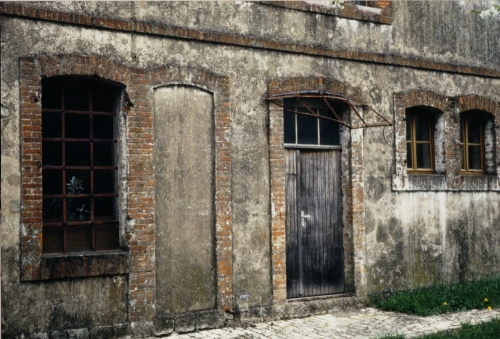
-
Exil / Exile (2012)
FRANÇAIS
Une rue sinistre, qu'on dirait abandonnée et inhabitée depuis une quelconque guerre. Partout, de vieux volets métalliques perpétuellement fermés. Les barreaux aux fenêtres des rez-de-chaussée évoquent des images de prisons, d'internats vieillots et humides, de jeunesse inconfortable et triste.
Sigrid vivait là, et c'était le décor parfait pour son exil intérieur dans la pauvreté et l'humiliation, dont je me demandais à quel degré il était volontaire. Pour arriver à son appartement il fallait emprunter, à travers des couloirs étroits et mal éclairés, un trajet tortueux qui donnait l'impression de s'enfoncer dans des bas-fonds secrets ; un labyrinthe invisible depuis la rue, menant à des enfers privés, insoupçonnables.
J'ai gardé, au fil des années, ses adresses successives dans un répertoire. Elles forment un pauvre itinéraire, peu parlant, mais qui comme les numéros de téléphone ou les bribes de conversation dans un dossier d'archives, sont les seules choses tangibles auxquelles je puisse me raccrocher.
ENGLISH
A grim street, seemingly abandoned and uninhabited since some forgotten war. Everywhere, old metal shutters permanently closed. The bars on the ground-floor windows evoked images of prisons, of damp, outdated boarding schools, of an uncomfortable and sorrowful youth.
Sigrid lived there, and it was the perfect setting for his inner exile into poverty and humiliation, the degree to which it was voluntary I often wondered. To reach his apartment, you had to follow a tortuous path through narrow, poorly lit corridors, giving the impression of descending into hidden depths; an invisible labyrinth from the street, leading to private, unsuspected hells.
Over the years, I kept his successive addresses in a notebook. They form a poor itinerary, scarcely meaningful, but like old phone numbers or scraps of conversation in an archive file, they are the only tangible things I have left to hold on to.
-
Squat
FRANÇAIS
Je suis avec Sébastien et nous marchons dans de vieilles rues décrépies ; il fait froid, gris, triste, mais ça n'a rien d'angoissant. Nous découvrons une maison abandonnée, et y entrons. C'est la nuit. Nous nous installons sur des matelas au sol pour y dormir. On entend des voix dans une pièce adjacente ; il y a d'autres squatters. Cela n'a rien d'angoissant, au contraire, on se sent protégé, ensemble, dans un cocon communautaire. Une femme enceinte passe dans ce qui nous sert de chambre. Benoît est là. Laura aussi.
ENGLISH
I'm with Sébastien, and we're walking through old, crumbling streets; it's cold, grey, and somber, but there's nothing frightening about it. We come across an abandoned house and go inside. It's nighttime. We settle down on mattresses on the floor to sleep. We hear voices in an adjacent room – there are other squatters. It doesn't feel scary; on the contrary, we feel safe, together, in a kind of communal cocoon. A pregnant woman walks through what now serves as our room. Benoît is there. Laura too.
-
Barcelonight - Annie Goetzinger
-
Rue de Maréville
FRANÇAIS
J'ai réalisé quelque chose cette semaine : le rêve est plus réel que la veille. La vie diurne, la vie quotidienne, la vie réputée réelle, est qui objectivement est évidemment réelle, ne paraît pourtant pas réelle ; elle a l'air d'un rêve cotonneux, répétitif, grisâtre, où rien n'a vraiment d'importance ou de poids, tant nous sommes pris dans des habitudes, des automatismes, des situations stéréotypées qui ne demandent aucune attention véritable ; dans une pauvreté d'existence ; et nous nous perdons dans des rêveries, des fantasmes, des projets, des fictions, du matin au soir, pour échapper à cela.
À l'inverse, dans les rêves, on ne rêvasse pas : on est bien là, on est attentif, on expérimente le monde dans toute sa réalité, toute son intensité. Les décors, les objets, les gens, les situations. On vit l'instant en pleine conscience.
Cela m'a fait penser à cette expérience récente alors que j'étais en voiture avec France vers ce bar où avait lieu une soirée. Nous étions passés, juste après la tombée de la nuit, dans cette longue rue de Maréville, discrète, paisible, qui va de Laxou à Nancy, et où l'on ne s'arrête pas si l'on a rien à y faire ; un pur lieu de passage auquel on ne prête habituellement pas attention. Elle était peu éclairée et j'avais eu l'impression d'être entré dans une zone étrange, délabrée, désertée, anarchique, une bulle de calme entourée de larges boulevards et de voies rapides.
Les maisons de ville aux crépis sales, noircis par le temps et la fumée, ou aux couleurs brunâtres, terreuses, m'avaient rappelé la campagne et évoqué, comme toujours, les photos sépia, le passé, la terre meuble d'une tombe. Ces maisons étaient parfois à moitié cachées au fond de petits jardins, ou derrière des murets de béton comme chez mes grands-parents quand j'étais enfant.
Des parkings sauvages et des terrains vagues, herbeux, abandonnés, entre des maisons de ville – un gâchis d'espace proprement miraculeux à notre époque d'optimisation forcenée.
Même les résidences neuves, modernes, au sens hideux du terme, avaient quelque chose de confortable, bordélique, accueillant, comme le reste de la rue. Les balcons étaient encombrés de plantes vertes, de parasols, de mobilier de jardins, j'avais eu l'impression de retrouver le bric à brac de mon enfance, chez mes parents ou ma grand-mère maternelle.
La dernière chose qui m'avait marqué était ce vieil homme assis en train de lire, parfaitement visible à travers une baie vitrée, à un quelconque étage d'un immeuble moderne – peut-être un EHPAD, d'ailleurs. Le contraste entre l'obscurité presque totale de la rue où nous passions en voiture et la chaleur, la lumière, la paix qui régnait derrière cette vitre, m'avait saisi.
Il faudrait réussir à reproduire à volonté cette expérience mentale d'attention aiguë, de sensibilité exacerbée à l'environnement, cette impression de réel.
ENGLISH
I realised something this week: dream is more real than being awake. Day‑time life, everyday life – the life we agree is "real" and which, objectively, obviously is real – doesn’t feel real; it resembles a fuzzy, repetitive, greyish dream in which nothing truly matters or carries weight, because we’re trapped in habits, automatisms, stereotyped situations that demand no genuine attention, trapped in the poverty of mere existence. From morning till night we lose ourselves in daydreams, fantasies, plans, fictions, just to escape it.
By contrast, in dreams we don’t drift – we are fully present, alert, experiencing the world in all its reality and intensity: the settings, the objects, the people, the situations. We live the moment in complete awareness.
It reminded me of a recent moment when I was in the car with France heading to a bar for an evening out. Just after nightfall we drove down that long Rue de Maréville – quiet, discreet, running from Laxou to Nancy – where you never stop unless you have business there, a pure passageway that usually draws no notice. Dimly lit, it felt as though I had entered a strange, dilapidated, deserted, anarchic zone, a bubble of calm surrounded by wide boulevards and expressways.
The townhouses, their stucco façades grimy, blackened by time and smoke, or painted in brownish, earthy tones, reminded me of the countryside and evoked, as always, sepia photographs, the past, the loose soil of a grave. Some houses were half‑hidden at the back of small gardens or behind concrete walls like the ones at my grandparents’ when I was a child.
There were informal parking lots and grassy, abandoned vacant lots between the houses – a positively miraculous waste of space in our age of relentless optimisation.
Even the new, "modern" apartment blocks – in the ugliest sense of the word – had something comfortable, messy, welcoming about them, like the rest of the street. Balconies were heaped with green plants, parasols, garden furniture; I felt I had recovered the jumble of my childhood, at my parents’ place or my maternal grandmother’s.
The last thing that struck me was an old man sitting and reading, perfectly visible through a picture window on one of the upper floors of a modern building – perhaps a care home. The contrast between the almost total darkness of the street we were driving along and the warmth, the light, the peace that reigned behind that pane shook me.
If only one could summon at will that mental state of keen attention, of heightened sensitivity to one’s surroundings, that impression of the real.
Lien permanent Catégories : Blog, Explorations, Nancy, Trajets en voiture / Car rides 0 commentaire Tweet
Tweet
-
Hall
FRANÇAIS
Je me fais menacer ou harceler par je ne sais qui, à la fac ou dans ma cité U. Quoi qu'il en soit, c'est un immense bâtiment avec un très large hall, qui fait penser à un hall d'hôtel. Il y a beaucoup de monde. Il fait sombre, tout semble gris, poussiéreux, vieux. J'envisage d'aller demander de l'aide à l'appariteur. Je m'approche de sa loge, qui est en fait un comptoir, comme un comptoir d'hôtel, dans le hall de l'immeuble. Un vieux comptoir en bois, assez vieillot, décrépi, même. Il donne, à l'arrière, sur ce qui semble être un bar ou un restaurant, un lieu convivial en tous cas. J'entends parler ou peut-être lis quelque chose au sujet d'une soirée qui aurait bientôt lieu là. J'ai envie d'y aller et d'avoir une vie sociale ici, dans ce lieu grisâtre et délabré.
ENGLISH
I get threatened or harassed by I don't know who, at college or in my cité U. Anyway, it's a huge building with a very wide hall, reminiscent of a hotel lobby. It's very crowded. It's dark, everything looks gray, dusty and old. I'm thinking of asking the usher for help. I approach his lodge, which is actually a counter, like a hotel counter, in the lobby of the building. An old wooden counter, rather old-fashioned, even decrepit. At the back, it opens onto what appears to be a bar or restaurant, a convivial place in any case. I hear or maybe read about a party that's going to take place there soon. I want to go there and have a social life here, in this grayish, dilapidated place.
-
Foyer Sonacotra / Sonacotra hostel (1996)
FRANÇAIS
Il vivait dans l'un de ces quartiers ouvriers sordides et décrépis qui bordent le canal, aux abords d'une boulangerie industrielle. Je serais incapable de retrouver les lieux. Je me souviens de l'énorme cour intérieure où il disait faire du taï-chi très tôt le matin. Dans mon souvenir, elle était moins une cour qu'un terrain vague, offrant depuis l'appartement, dans les étages, une vue imprenable sur le désastre urbanistique, économique et humain qu'était ce quartier, et que j'aimais précisément pour cette raison. Je me souviens avoir exploré l'appartement en-dessous du sien, abandonné depuis l'incarcération de son locataire. Je lui avais volé deux pellicules, que je n'avais finalement jamais fait développer. Il y avait un foyer Sonacotra non loin, dont il m'avait raconté que des pensionnaires en avaient défenestré un autre. Je n'avais pas jugé bon de lui dire qu'une de mes tantes, alcoolique et schizophrène, avait passé une partie de sa vie dans des foyers de ce genre. Pas plus que je n'avais osé lui dire – mais peut-être aussi n'en avais-je pas encore vraiment conscience à l'époque – que ce monde-là m'attirait, que je sentais obscurément qu'un jour je finirais dans une semi-prison, un purgatoire de ce genre, et que c'était une idée effrayante mais attirante aussi, comme l'entrée au monastère, un abandon voluptueux.
ENGLISH
He lived in one of those squalid, decaying working-class neighborhoods lining the canal, near an industrial bakery. I wouldn't be able to find the place again. I remember the enormous inner courtyard where he claimed to practice tai chi very early in the morning. In my memory, it was less a courtyard than a wasteland, offering from the apartment above an unobstructed view of the urban, economic, and human disaster that was this neighborhood – and which I loved precisely for that reason.
I remember exploring the apartment below his, abandoned since its tenant had been incarcerated. I stole two rolls of film from it, which I ultimately never had developed. There was a Sonacotra hostel nearby, and he told me that some of its residents had once thrown another out the window. I didn’t think it necessary to tell him that one of my aunts – an alcoholic and schizophrenic – had spent part of her life in places like that. Nor did I dare tell him – or perhaps I wasn’t even fully aware of it myself at the time – that I was drawn to that world, that I had a vague sense I would one day end up in a semi-prison, some kind of purgatory like that, and that it was a frightening idea, but also an alluring one, like entering a monastery or surrendering completely, voluptuously, to irresponsibility.
He lived in one of those squalid, decaying working-class neighborhoods lining the canal, near an industrial bakery. I wouldn't be able to find the place again. I remember the enormous inner courtyard where he claimed to practice tai chi very early in the morning. In my memory, it was less a courtyard than a wasteland, offering from the apartment above an unobstructed view of the urban, economic, and human disaster that was this neighborhood – and which I loved precisely for that reason.
I remember exploring the apartment below his, abandoned since its tenant had been incarcerated. I stole two rolls of film from it, which I ultimately never had developed. There was a Sonacotra hostel nearby, and he told me that some of its residents had once thrown another out the window. I didn’t think it necessary to tell him that one of my aunts – an alcoholic and schizophrenic – had spent part of her life in places like that. Nor did I dare tell him – but perhaps I wasn't really aware of it at the time – that this world attracted me, that I had a vague feeling that one day I would end up in a kind of semi-prison, a purgatory of sorts, and that it was a frightening but also appealing idea, like entering a monastery, a voluptuous abandonment.
Note:
"Sonacotra hostels" were residential facilities originally established in France in the 1950s to house immigrant workers, particularly from former French colonies in North and West Africa. Managed by the state-owned company Sonacotra (Société nationale de construction pour les travailleurs), these hostels were intended as temporary housing but often became long-term residences. Over time, many became associated with overcrowding, social isolation, and marginalization, reflecting broader issues of immigration and urban poverty in postcolonial France.
-
Art Zoyd - Trio Lettre d'Automne
-
Préville (1996)
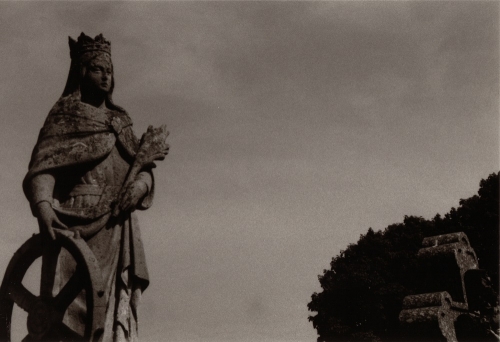
-
L'hôpital central / Central hospital
FRANÇAIS
Après l’avoir amenée à l’hôpital central et confiée aux médecins, je patiente plusieurs heures, assis, sans rien faire, dans la salle d'attente. Je me sens bien ; non pas en dépit des circonstances et de l'endroit, mais à cause d'eux. Ma mère a travaillé toute sa vie dans un hôpital et j'aime me retrouver dans ce décor, avec ses odeurs. En face moi, un homme d'âge mûr pleure.
ENGLISH
After taking her to the central hospital and entrusting her to the doctors, I wait for several hours, sitting idly in the waiting room. I feel fine, not despite the circumstances and the place, but because of them. My mother worked in a hospital her whole life, and I like being in this setting, with its smells. Across from me, a middle-aged man is crying.
-
Blanchisserie de Malzéville
Photo par "Dadou Jones"
-
Façades noircies (2013) / Black walls (2013)
FRANÇAIS
Une chaise est posée contre un mur, incongrue, au fond d'une ruelle crasseuse. Comme une invitation à s'arrêter là, à trouver son repos dans une éternité de décrépitude miséricordieuse.
Des fenêtres fermées, noires. Que cachent-elles ? Quels labyrinthes, quels taudis, quelles puanteurs, quelles poches de ténèbres merveilleuses cachent-elles ?
ENGLISH
A chair is placed against a wall, incongruous, at the end of a filthy alley. Like an invitation to stop there, to find rest in an eternity of merciful decay.
Closed, black windows. What do they hide? What labyrinths, what slums, what stench, what pockets of marvelous darkness do they conceal?
-
Cyprès / Cypresses (2005)
FRANÇAIS
Je marche dans les rues. La pluie, l'ennui. Moins de souvenirs et d'émotion à chaque nouvelle visite. Pour ainsi dire : plus rien. La ville que j'ai connue dix ans auparavant n'est plus qu'un paysage imaginaire dont je dois me contenter. La fac de Lettres, ses Che Guevara crasseux qui vendent des légumes dans des cageots devant le grand amphi. Les murs taggés, partout, de slogans puérils. Je repars en revoyant des images de promenade nocturne sur le campus, avec Lydie ; le ciel étoilé, l'herbe sous nos pieds, de hauts cyprès, les barrières au loin. Mais je n'arrive pas à me souvenir si nous l'avons vraiment fait un jour, ou si c'était en rêve.
ENGLISH
I walk through the streets. Rain, boredom. Fewer memories, fewer feelings with each new visit. Soon, nothing at all. The city I once knew ten years ago is now just an imaginary landscape I have to make do with. The Humanities faculty, those grimy Che Guevaras selling vegetables from crates in front of the main lecture hall. The walls, covered everywhere in childish slogans. I leave again, recalling fragments of a nighttime walk on campus with Lydie – the starry sky, the grass beneath our feet, tall cypresses, fences in the distance. But I can’t quite remember if it really happened one day, or if it was only a dream.
-
Raz de marée / Flood
FRANÇAIS
Je suis dans une ville ; une version alternative de Nancy, comme souvent en rêve. Quelque chose de plus sale, et moite, dans ce que ça a d'agréable et presque d'érotique. Comme dans certaines villes du Sud. Je suis censé y habiter, ou peut-être y loger pour quelques temps ; j'ai ma soirée de libre, et je pense à Laurence en me disant qu'il ne faudrait pas que je reste trop de temps sans lui donner de nouvelles, mais je passe une bonne soirée. Il y a une sorte de fête dehors, quelque chose comme un concert devant un bar, avec beaucoup de monde sans que ça fasse mouvement de foule ; une notion d'ivresse, de soirée d'été. Ensuite je suis sur une plage, avec d'autres types. Peut-être qu'on y travaille, ou qu'on explore quelque chose. Une étendue de sable, de roche, pentue, peut-être, et désolée. L'eau commence à monter ; je me retourne. Un raz de marée arrive et envahit tout.
ENGLISH
I'm in a city – an alternate version of Nancy, as often happens in dreams. Something dirtier, and humid, in a way that’s pleasant and almost erotic. Like certain cities in the South. I'm supposed to be living here, or maybe just staying for a while; I have the evening free, and I think about Laurence, telling myself I shouldn't go too long without reaching out to him – but I'm having a good evening. There's some kind of party outside, something like a concert in front of a bar, with a lot of people, though not quite a crowd; a sense of intoxication, of a summer night. Then I'm on a beach, with other guys. Maybe we're working there, or exploring something. A stretch of sand, and rock, sloping perhaps, and desolate. The water starts to rise; I turn around. A tidal wave is coming and floods everything.
-
Taxi Girl - Les Armées de la nuit
-
Exactement nulle part / Exactly nowhere
FRANÇAIS
J'ai récemment été avec France à la fête médiévale qui se tient tous les ans à quelques kilomètres de chez elle. Nous sommes passés en voiture (c'est moi qui conduisais) à travers plusieurs villages sur le trajet, où je n'avais pas remis les pieds depuis cette journée à vider la maison de la grand-mère de L. et dont je n'avais aucun souvenir.
Il faisait incroyablement beau et France elle-même a fait la réflexion que ça sentait les vacances ; le ciel bleu, la végétation luxuriante, le fait même de rouler en voiture... Je n'avais jamais roulé dans ces communes qui bordent la grande ville, et cela me mettait dans un état mental assez étrange ; c'était comme me retrouver « pour de vrai » dans ces rêves où je marche ou bien roule seul dans la ville, mais dans une version étrangère, parallèle, inconnue.
C'était aussi comme revenir dans certains souvenirs, ou revoir une photo ancienne, oubliée, de ma jeunesse, mais en élargissant son cadre aux paysages environnants, et en ayant une chance d'y entrer, de les explorer. Un voyage dans le temps, l'espace, la mémoire.
Ces villages font partie de ces zones étranges comme il y en a beaucoup autour de la ville, ou plus exactement des non-zones, des non-lieux, juxtapositions incohérentes, comme dans les rêves, de fermes ancestrales bordées par un magasin ACTION ou une pizzéria, et où l'on passe en quelques dizaines de mètres de jardins ouvriers à des tours d'habitation, des maisons Phoenix, des entrepôts, des terrains en friches. On est ni en ville, ni à la campagne, ni dans une zone commerciale ou industrielle. On est précisément, exactement nulle part.
ENGLISH
I recently went with France to the medieval fair that takes place every year a few kilometers from her home. We drove there (I was the one driving), passing through several villages along the way – places I hadn't set foot in since that day we emptied L.'s grandmother’s house, and of which I had no memory.
The weather was unbelievably beautiful, and France herself remarked that it smelled like vacation – the blue sky, the lush vegetation, even just the act of driving... I had never driven through these towns that line the outskirts of the big city, and it put me in a rather strange state of mind. It was like finding myself for real inside those dreams where I’m walking or driving alone through a city – but in a foreign, parallel, unknown version of it.
It also felt like returning to certain memories, or like seeing an old, long-forgotten photo from my youth – but with the frame widened to include the surrounding landscapes, and the chance to step into them, to explore them. A journey through time, space, and memory.
These villages are part of those strange zones you find often around the city – or more precisely, non-zones, non-places. Incoherent juxtapositions, like in dreams: ancestral farms next to an ACTION store or a pizza place, where you pass in a matter of meters from community gardens to apartment blocks, prefab houses, warehouses, and overgrown vacant lots. It’s not the city, not the countryside, not a commercial or industrial zone. It’s exactly, precisely nowhere.
-
Vieille ville / Old town (1998)
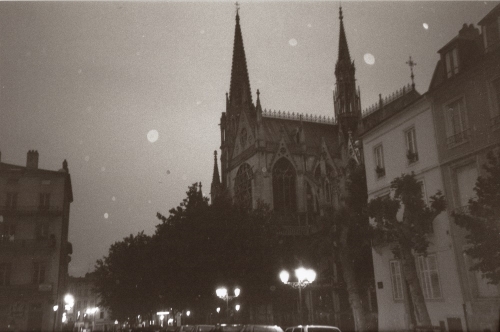
-
Jeunesse / Youth
FRANÇAIS
Je suis seul dans un couloir d'immeuble, ouvert d'un côté sur une vaste cour intérieure, qui donne sur d'autres couloirs, d'autres logements ouverts, des terrasses, etc. Je regarde particulièrement un minuscule appartement au dernier étage, qui n'est séparé du ciel que par une bâche en plastique. Je me demande comment la personne qui y vit fait quand il pleut, ou en hiver. Peut-être est-ce l'appartement d'une fille que j'ai connue, ou le mien quand j'étais jeune, ou les deux à la fois. Ce décor me renvoie à ma jeunesse, à la notion de solitude, d'inconfort, de pauvreté, de vulnérabilité que j'associe à la jeunesse, à la première expérience de la vie seul, que j'essaie généralement d'oublier, et j'entends mentalement une musique étrange, mélange de bruits parasitaires et d'une voix de cantatrice déformée et dissonante, que j'identifie comme une musique que j'aurais soit écoutée, soit composée, autrefois ; et cette musique m'angoisse, elle est oppressante et malsaine, et elle me renvoie à un dernier souvenir. Le souvenir d'instants de terreur, à la fin de mon adolescence et au début de mes études, où dans un demi-sommeil je sentais une présence mauvaise autour de moi, dans ma chambre, dans mon studio, une présence maléfique que j'oubliais et voulais oublier la plupart du temps, mais dont la conscience me revenait dans l'assoupissement ou au réveil, et c'était alors tout le reste de ma vie qui n'était qu'un rêve.
ENGLISH
I am alone in an apartment building hallway, open on one side to a vast inner courtyard, which connects to other hallways, other exposed apartments, terraces, and so on. My gaze is drawn in particular to a tiny apartment on the top floor, separated from the sky only by a plastic tarp. I wonder how the person living there manages when it rains, or in winter. Maybe it's the apartment of a girl I once knew, or mine when I was young – or both at once. This setting brings me back to my youth, to the notion of solitude, discomfort, poverty, vulnerability – things I associate with being young, with the first experience of life alone, something I usually try to forget. And in my mind, I hear a strange kind of music, a mix of static noise and a distorted, dissonant opera singer’s voice. I recognize it as music I once either listened to or composed – and it unsettles me. It’s oppressive and unhealthy, and it brings back one final memory. A memory of moments of terror, at the end of my adolescence and the beginning of my student years, when in a half-sleep I would feel a malevolent presence around me – in my bedroom, in my studio – a dark presence that I would mostly forget, or want to forget, but whose awareness would return to me in drowsiness or upon waking. And then it would seem as if the rest of my life was nothing but a dream.
